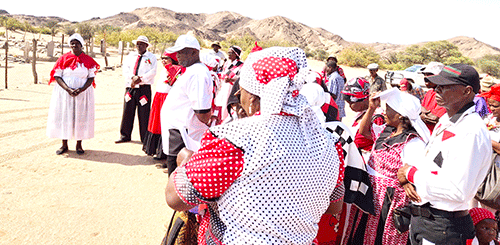Charles Ndeumane
Since their repatriation to Namibia in 1974 and applying for the recognition of their traditional authority in 1998, the descendants of the Riemvasmaak who survived the genocide, are still struggling to get their community recognised.
Riemvasmaak is a community of Namibians from different ethnicities who fled to South Africa during the genocide era, and settled in the Riemvasmaak area.
While in South Africa, those ethnic groups became one community.
They were later joined by Xhosas and other South African ethnic groups.
After many years of living together, they adopted one culture and tradition, now identifying as Riemvasmaakers.
With the intervention of Roman Catholic missionaries, these people were repatriated to Namibia in 1974 and settled in Deriet in the Kunene region, where they live today in the Ward 11 settlement in a well-developed community.
The deputy minister of Gender Equality, Poverty Eradication and Social Welfare, Bernadette Jagger, revealed during an interview that she was born and raised in the Riemvasmaak community in Deriet.
She strongly believes their community not only qualifies to be recognised as a traditional authority, but it deserves such recognition.
She emphasised that Riemvasmaak is not a name of an ethnicity, for instance, Oshiwambo, but rather a name of a community of people from various ethnic groups.
“I was born and raised in the Riemvasmaak community in Deriet. When our people fled to South Africa, the Roman Catholic missionaries informed the South African authorities, and they settled in the Riemvasmaak settlement in South Africa. There, different tribes became one after years of living together and through intermarriages. If you found an Owambo or a Nama person from our community, you couldn’t tell what tribe they are because we have become one culture – one tradition,” she said.
She added that the community has faced many setbacks in their quest to have their traditional authority recognised.
“As a community with its norms, values and culture, we applied for recognition in 1998 to the Ministry of Regional and Local Government, and a committee from the ministry came to visit our community for discussions. Other local authorities tried to claim our community, and this has been the main cause of delay in the recognition,” she added.
The special advisor to the council, Tommy Adams, said besides living in Namibia their whole lives, they have become a fully-functional community with responsible Namibian citizens who contribute to the country’s gross domestic product.
“I was born in Riemvasmaak in South Africa, but I came to Namibia when I was two years old. I am now 54 years old – we are Namibians. When we settled here, we were received by the Garib (chief) of the Damara people, who gave us this land, which was at the time inhabited by wild animals.
“We learned to live among them, and we tamed them in the Tora Conservancy. The requirement to be recognised as a traditional authority is to have land, and we have land. We want our Riemsvasmaak community in the settlement of Ward 11 in Deriet to be recognised as a traditional authority,” he said.
He added that they have contributed greatly to the development of their community.
“Throughout the years, our community has produced some brilliant brains that drive our nation. For example, Jagger is from our community. On our initiative, we built a school, and handed it over to the government. Just before Covid-19, we handed an ambulance over to the government,” he noted.
He said they are a peace-loving community, and it would empower them as Namibians to have their traditional authority recognised.



